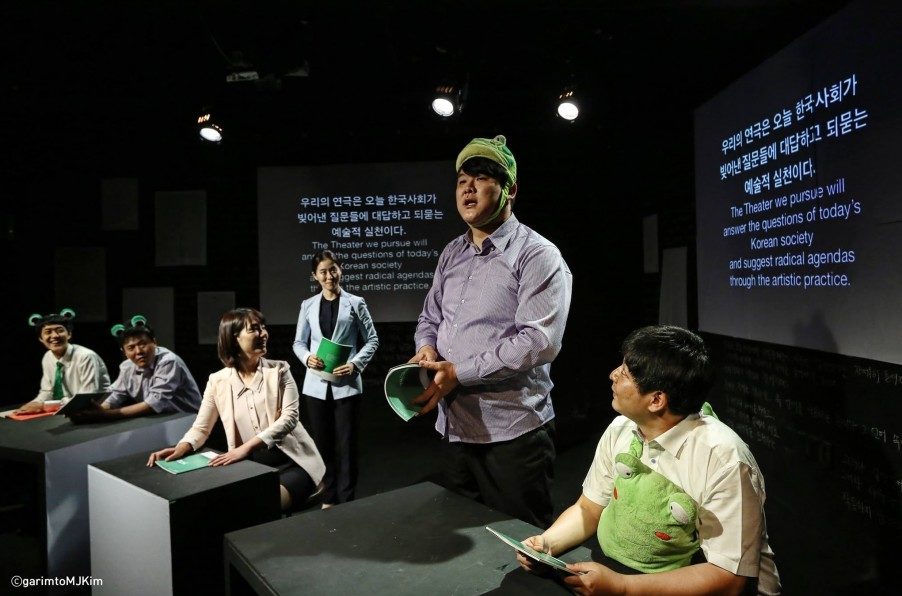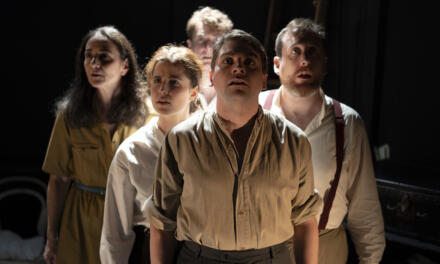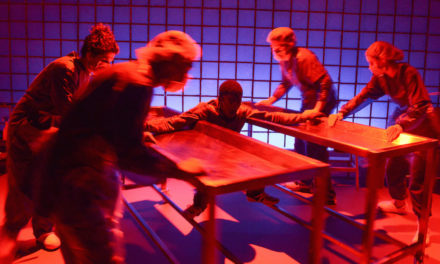At this moment, 2017 promises to be a challenging year for Korean theatre, as it carries over the unresolved problems and issues from 2016. The 2016 Korean theatre scene can be marked as one of tumultuous uproar as politics shook the theatre inside and out. Continuing government censorship brought the theatre community together in protest. The Kim Young-Ran Law caused serious financial damage to theatre companies, as it diminished corporate sponsorship of the arts. Since news of the corruption scandal involving President Geun-Hye Park and her childhood friend and daughter of a cult leader Soon-Sil Choi broke out last November, the whole country has been in turmoil. People have been protesting in downtown Seoul demanding the impeachment of President Park. Nevertheless, the theatre community did not miss celebrating the 400th anniversary of Shakespeare’s death. Korea and France created a theatrical exchange, and several veteran theatre companies celebrated their longevity.
Project for Right 2016: Against Censorship
President Geun-Hye Park’s administration advocated a basic policy in support of art and culture. Nevertheless, the issue of government censorship has been a constant cause of conflict between the administration and the art community. The government censorship scandal was initiated in 2014 when the parliamentary inspection of the administration’s arts funding proposal revealed that Arts Council Korea had removed the 2015 Seoul Theatre Festival from its general review for funding. The scandal grew in scope when funds for veteran playwright and director Kunhyung Park’s All the Soldiers are Pathetic and Youn-Taek Lee’s Time to Offer Flowers were cut despite critical acclaim. It was speculated that Park and Lee were eliminated from funding opportunities because they allegedly expressed their anti-administration sentiments – namely, that Park had satirized President Geun-Hye Park and her father (the former dictator President Jung-Hee Park) in his 2013 play Frog, which was produced at the National Theatre Company of Korea; and that Lee had given a speech in support of Jae-In Moon, who was running against President Park in the 2012 presidential election. For the same reason, several plays, including Dawon Art Company’s Ansahn Pilgrimage about the Sewol Ferry disaster, which sank and killed about 300 passengers (mostly high school students on a class trip) in 2014, were left out of consideration for funding.
The theatre community continuously demanded an explanation for these actions, but the Ministry of Culture, Sports, and Tourism and Arts Council Korea refused to give any justification. In 2016, several young theatre artists and companies formed a collective, demanding an end to such political censorship. From early June to the end of October, about twenty theatre companies organized the festival, “Project for Right 2016: Against Censorship” at Yeonwoo Theater, a 90-seat venue, located in Daehangno, Seoul. These companies presented pieces criticizing and satirizing government censorship each week from Thursday through Sunday, for the whole five months. Each piece was devised as an immediate response to the censorship, intent on exploring the core of this problem and creating a site for uninhibited artistic expression and discussion.
The pieces ranged from plays that directly portrayed cases of government censorship to those that humorously depicted a day in the life of a government censor. Forty out of the 110 performances sold out, for which some venues had to add extra chairs. Project for Right did not receive any national or public funding, but rather acquired its financial resources through private donations. Inspired by the festival’s success, Executive Director Soo-Hee Kim is seeking to involve more venues so that this project can continue and expand in the following years.
The Kim Young-Ran Law
The scope of the Kim Young-Ran Law, which was originally instituted to prevent major corporations from illegally offering bribery to elected public officials, was expanded to include employees of public relations groups, public schools, and even the press. As a result, sponsorships and donations by major corporations to artistic organizations have decreased significantly. The art forms most affected included classical concerts and high-priced musicals, which have usually depended on corporate sponsorship for production as well as promotion costs. No clear solution seems to be at hand yet.
Honoring Shakespeare and Korean Theatre Veterans
Despite the dark cloud hovering over the theatre community demanding an end to government censorship, and the struggle to find funding and sponsorship, a silver lining can be found in a few instances. The 2016 theatre scene saw an occasion for celebration for the 400th anniversary of Shakespeare’s death. About one hundred Shakespeare productions, Korean and international, opened, ranging from plays to musicals, operas, ballets, and contemporary adaptations. Hamlet was produced in about twenty different iterations. All six screenings of England’s National Theatre Live’s Hamlet (2015) starring Benedict Cumberbatch were sold out immediately. In addition, Shakespeare’s anniversary coincided with the hundred-year anniversary of the births of the four founding fathers of Korean theatre: Dong-Won Kim, Won-Kyung Lee, Jin-Soon Lee, and Hae-Rang Lee. In honor of the late actor and director Hae-Rang Lee, the National Theatre Company of Korea and Company SeenSee coproduced Hamlet with the cast including several of the most respected veterans of the Korean theatre including Jung-Ja Park, Moo-Song Jeon, Sung-Ryuh Kim, In-Chon Yoo, Suk-Hwa Yoon, and Sook Sohn. This coproduction of Hamlet was one of the most successful productions last year.
Korea-France Theatrical Exchange
There was also an increased theatrical exchange between Korea and France. In Korea, The National Theatre produced several French original plays and collaborations, and in France, several Korean productions were staged in major theatres. Contemporary dancer Eun-Me Ahn was the biggest star of this cultural exchange with the success of her three pieces Dancing Teen Teen, Dancing Grandmothers, and Dancing Middle-Aged Men at the Théâtre de la Ville in Paris. These pieces travelled worldwide with great acclaim. (video attached)
Theatre Companies Celebrating Longevity
The year 2016 also marked the twentieth through fiftieth anniversaries of several seasoned theatre companies. Theatre Group Jayumadang celebrated its fiftieth anniversary, while Company 76, Hyundai Theatre, Company Roots, and Company Cecile had their fortieth. In addition, Theatre Group Georipae, Company Small Myth, and Company Arirang had their thirtieth anniversaries, and Baeksutheater had its twentieth, for a total of nine companies celebrating milestone seasons. The longevity of these theatre companies not only serves as an example of the persistence of theatre in these trying times, but also presents successful examples for younger and emerging theatre companies and artists to aspire to.
The original article was posted in the Kukmin Daily. An expanded version was published in the blog web-zine MUST (http://must.caci.or.kr/?p=4578). Translated and edited by Walter Byongsok Chon with permission from author.
This post was written by the author in their personal capacity.The opinions expressed in this article are the author’s own and do not reflect the view of The Theatre Times, their staff or collaborators.
This post was written by Jiyoung Jang.
The views expressed here belong to the author and do not necessarily reflect our views and opinions.


















